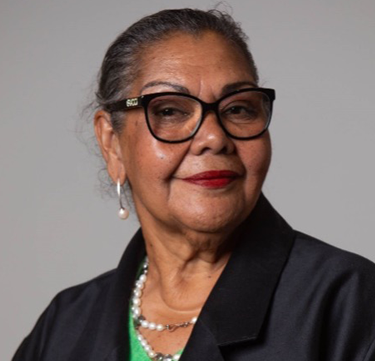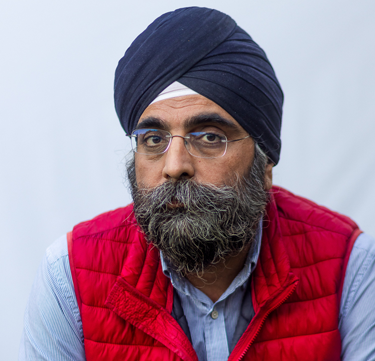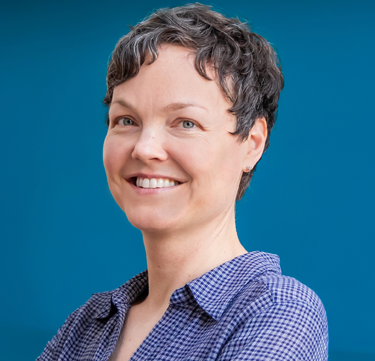June Oscar AO
Inaugural Chair, The Wiyi Yani U Thangani Institute for First Nations Gender Justice
OPENING KEYNOTE

June Oscar AO is a proud Bunuba woman from the remote town of Fitzroy Crossing in Western Australia’s Kimberley region. She is a strong advocate for Indigenous Australian languages, social justice, women’s issues, and has worked tirelessly to reduce Fetal Alcohol Spectrum Disorder (FASD). June has held a raft of influential positions including Deputy Director of the Kimberley Land Council, chair of the Kimberley Language Resource Centre and the Kimberley Interpreting Service and Chief Investigator with WA’s Lililwan Project addressing FASD. She led a successful community driven campaign for alcohol restrictions in Fitzroy Crossing and is an international advocate on the impacts of intergenerational trauma and the need to restore societal wellbeing through the revitalisation of cultural practices, languages and connection to land and water.
In 2013 June was awarded an Officer of the order of Australia for distinguished service to the Indigenous community of Western Australia, particularly through health and social welfare programs. In 2015, June received the Menzies School of Health Research Medallion for her work with FASD. In 2016, she was the recipient of the Desmond Tutu Global Reconciliation Award, she was named NAIDOC person of the year in 2018, and in 2019 she was bestowed the honorary role of a Distinguished Fellow of ANZSOG.
June completed her seven-year term as Australia’s Aboriginal and Torres Strait Islander Social Justice Commissioner in April 2024. As Commissioner she published the landmark Wiyi Yani U Thangani (Women’s Voices) Report in December 2020. In March 2024, June launched the Wiyi Yani U Thangani Institute for First Nations Gender Justice, based at the Australian National University. The Institute, a global first, will continue the vital work of Wiyi Yani U Thangani and advance and respond to the rights and aspirations of First Nations women and girls, inclusive of cis and trans women and gender diverse mob.
Indy Johar
RIBA register architect, serial social entrepreneur, and Good Growth Advisor to the Mayor of London, UK
KEYNOTE

Indy Johar is an RIBA register architect, serial social entrepreneur, and Good Growth Advisor to the Mayor of London. Indy was born in Acton, West London & is a lifelong Londoner. He is focused on the strategic design of new super scale civic assets for transition – specifically at the intersection of financing, contracting and governance for deeply democratic futures.
Indy is co-founder of Dark Matter Labs and of the RIBA award winning architecture and urban practice Architecture00. He is also a founding director of Open Systems Lab, seeded WikiHouse (open source housing) and Open Desk (open source furniture company). Indy is a non-executive international Director of the BloxHub, the Nordic Hub for sustainable urbanization. He is on the advisory board for the Future Observatory and is part of the committee for the London Festival of Architecture. He is also a fellow of the London Interdisciplinary School.
Indy was 2016-17 Graham Willis Visiting Professorship at Sheffield University. He was Studio Master at the Architectural Association (2019-2020), UNDP Innovation Facility Advisory Board Member 2016-20 and RIBA Trustee 2017-20. He has taught & lectured at various institutions from the University of Bath, TU-Berlin; University College London, Princeton, Harvard, MIT and New School. He was awarded the London Design Medal for Innovation in 2022 and an MBE for Services to Architecture in 2023.
James Copestake
Professor, International Development, University of Bath, UK
KEYNOTE

James Copestake is Professor of International Development at the University of Bath in the UK, where he is also Director of Studies for the Doctorate in Policy Research and Practice at the Institute of Policy Research.
His publications range broadly across international development evaluation, finance, management, political economy and theory. They draw on collaborative research conducted particularly in Bolivia, Britain, Ethiopia, Ghana, India, Malawi, Peru and Zambia.
His recent work has focused on mixed methods impact evaluation, particularly incorporating use of the Qualitative Impact Protocol (QuIP) and based on evaluation work conducted through Bath Social and Development Research Ltd (www.bathsdr.org), a social enterprise he cofounded in 2016. He is also currently a trustee of Opportunity International UK.
Elizabeth Hoffecker
Lead Research Scientist, Local Innovation Group, Massachusetts Institute of Technology (MIT), US
KEYNOTE

Elizabeth Hoffecker is a social scientist who researches and evaluates processes of local innovation and systems change in the context of addressing global development challenges. She directs the MIT Local Innovation Group, an interdisciplinary research group housed at the Sociotechnical Systems Research Center at the Massachusetts Institute of Technology in the US, where she has held the position of research scientist since 2017.
Elizabeth’s work focuses on developing and putting into use methods for understanding, assessing, and learning from change processes in complex systems, or what she calls 'complexity-aware' approaches to evaluation. She develops and uses these approaches to evaluate complex, system-level interventions into complex local systems such as agricultural systems, innovation systems, and educational systems, with current projects in northern India and Guatemala.
Over the past ten years, Elizabeth has led a portfolio of research projects across five continents and has translated insights from her research into teaching at multiple levels, from undergraduates to professionals. She is a co-creator of the Lean Research approach for improving the experience of research participants in international development and humanitarian work and is a 2019 recipient of MIT’s Infinite Mile Award for Innovation and Creativity.
John Gargani
President of Gargani + Company, former President of the American Evaluation Association, US
CLOSING KEYNOTE

Dr John Gargani is an evaluator with 30 years of experience and eclectic interests. He is President of the evaluation consulting firm Gargani + Company, served as President of the American Evaluation Association in 2016, coauthored the book Scaling Impact: Innovation for the Public Good, and has directed evaluations ranging from multi-site randomized controlled trials to early-stage innovation design. He is eager to engage conference participants in discussions related to impact, scaling, value, value for money, and AI in evaluation.
John spends most of his time conducting research, writing, speaking, and teaching on topics related to impact, scaling, and value. He believes evaluations should reflect and advance the diverse values held by the people affected. Perhaps controversially, he argues that quantitative methods can help evaluators achieve this by deepening their qualitative understanding of program impacts. He is putting this philosophy to the test by researching how AI may be used to evaluate the quality of classroom instruction and developing new methods for evaluating “value for money” from multiple perspectives without measuring value in monetary units (the latter will be discussed in a panel during the conference).
John teaches graduate students about evaluation, social entrepreneurship, program design, and impact measurement, most recently at Claremont Graduate University and University of Pennsylvania. He also offers professional development workshops around the world on a variety of topics, including how to scale the impact of social innovations.

